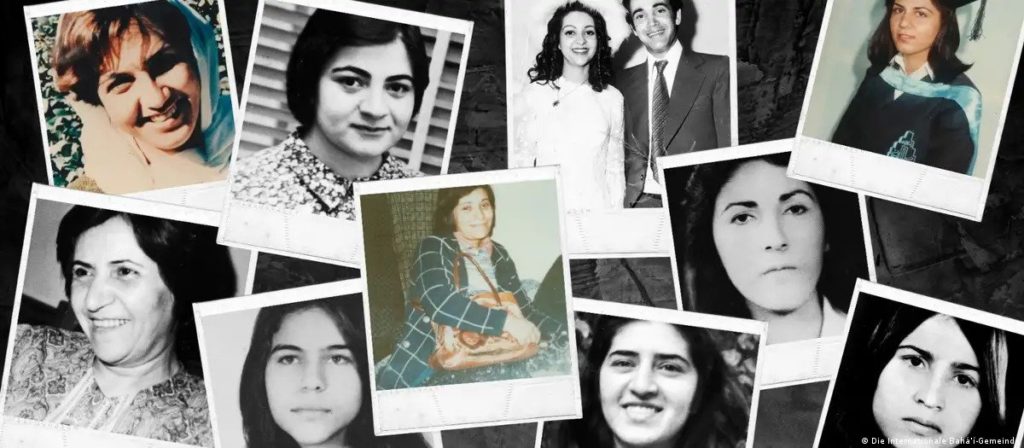Source: www.dw.com
Shabnam von Heim

In 1983, Iran hanged 10 Bahai women in public. The Bahai International Community has launched a campaign to mark the anniversary and raise awareness about the oppression of Iran’s largest non-Muslim religious minority.
One of the cruelest crimes to have befallen the oppressed Bahai minority of Iran took place 40 years ago in the southern city of Shiraz. On June 18, 1983, 10 women aged 17 to 57 were executed. As they waited their turn, they were forced to watch as their fellow prisoners were hanged one by one in a public square.
Their “crime” was that they belonged to the Bahai faith and had refused to renounce it. The youngest was Mona Mahmoudnejad, a 17-year-old who had taught Bahai children who had been forbidden from attending school.
None of the women’s bodies were released to their families, so they were denied a proper burial according to their religious rites, and the relatives were denied a proper goodbye. The same was true of the six Bahai men executed two nights before in the same square, some of whom were related to the women.
After the 1979 Islamic Revolution, more than 200 members of the Bahai community were executed in Iran.
International outcry put a stop to the executions, but the persecution continues. Jascha Noltenius, the human rights officer of the Bahai community in Germany, says it is vital for the Bahai in Iran that the international community pays attention to their situation.
They “are subject to systematic persecution,” Noltenius told DW. “This is evidenced by a state doctrine that prevents their development, destroys their roots and denies them the chance to study and work, as well as recurring waves of arrests and convictions just because of their religious affiliation.”
He added that the “existence of the largest non-Muslim minority in Iran would be threatened” if the international media “did not report on this and if governments and human rights organizations around the world did not demand equal treatment for the Bahai, in accordance with Iran’s obligations under international law.”
Not protected as recognized religious minority
Comprising some 300,000 members, the Bahai community makes up the largest religious minority in Iran. But unlike Christians, Jews and Zoroastrians, they are not protected by Article 13 of the Iranian constitution as a recognized religious minority.
The Bahai faith, which emerged in 19th-century Iran and has its background in Shiite Islam, is an independent religion that, for example, promotes gender equality. This has been rejected by conservative Islamic clerics in the country since the very beginning.
The Bahai have also been persecuted from the start, but their suffering intensified dramatically after the Islamic Revolution.
Iran’s Shiite rulers consider members of the Bahai community as apostates and treat them as second-class citizens. Bahai places of worship are banned and their access to education and jobs is restricted.
The Bahai are often arrested and tortured at will; their property and assets confiscated. They are monitored and harassed by the state.
Poet Mahvash Sabet tortured in jail
In the wake of the brutal suppression of nationwide anti-regime protests last year, pressure on the Bahai has intensified. On June 10, the daughter of the imprisoned poet Mahvash Sabet said in an interview with the US-based TV station Iran International that her family’s assets had been seized.
“My father was forced to hand over to the authorities a building that he financed brick by brick with his hard work. Just because we are Bahai,” said Negar Sabat, who now lives in Australia.
She also said that her 70-year-old mother, one of the most famous members of the Bahai community in Iran, had been maltreated in prison.
In May, PEN International, a worldwide association of writers, had reported that Mahvash Sabet’s knees had been broken during an interrogation. She had been forced to sit and her chair had been repeatedly slammed against the wall. X-rays taken at the jail had shown that torture had caused the fractures.
In 2017, Mahvash Sabet, whose Prison Poems were published in English in 2013, was named the PEN International Writer of Courage. The poet and former teacher was incarcerated from 2008 to 2017 because of her faith. In November 2022, a judge sentenced her to 10 more years for “not learning her lesson.”
Growing sympathy for Bahai in Iran
“The sensitivity of Iranian society toward the Bahai community has increased,” said Iranian rights activist and Bahai community member Zhinoos Forootan. “When we report on the persecution and imprisonment of Bahai, we no longer hear comments such as ‘Maybe they did something and that’s why they were arrested’,” she said.
People in Iran are better informed because of the internet and social media, Forootan told DW from Australia where she is studying.
The Bahai International Community launched the #OurStoryIsOne to mark the 40th anniversary of the execution of the 10 Bahai women in Iran, to honor the executed women and women’s struggle for equality in general in Iran.
“Campaigns such as #OurStoryIsOne are helping to show that we are all working for the same cause,” Forootan said.
Leave a Reply